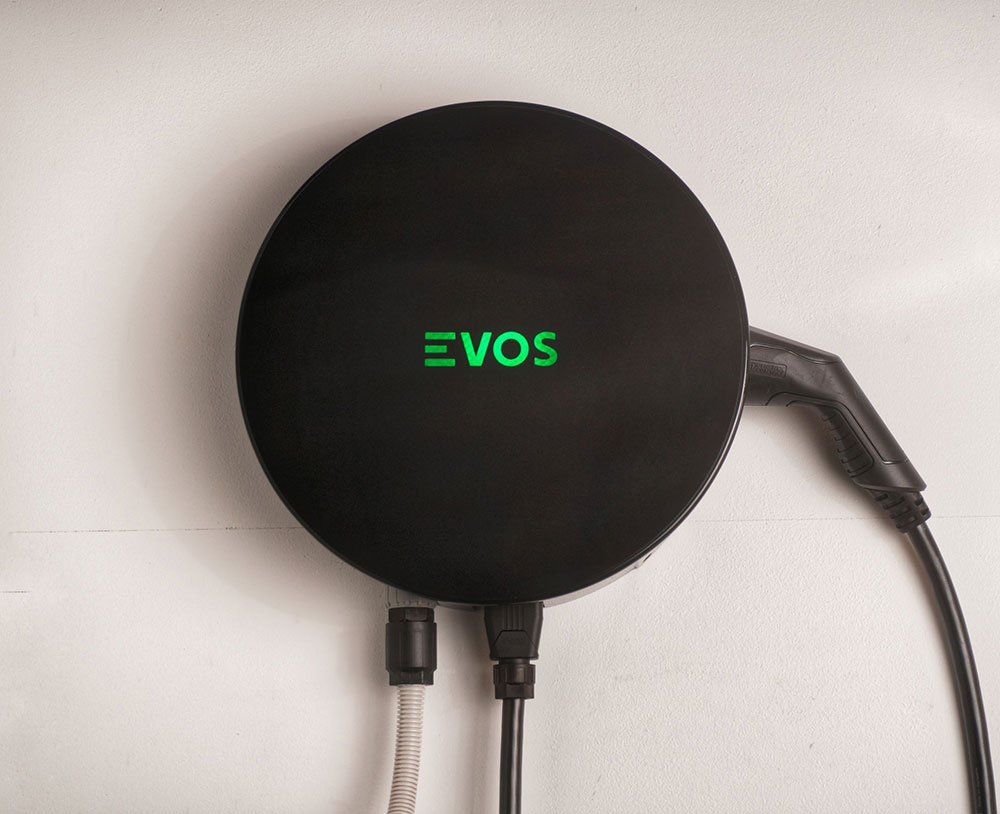Brisbane a bright light in EV charging

Brisbane’s status as a leader in the field of electric vehicle (EV) charging technology has been given a boost with local company EVOS launching the first Australian-made home charging solution.
The Queensland capital is already the global headquarters of Tritium, a leader in high-speed DC charging products, and now also of EVOS, a start-up specialising in fleet energy management and AC charging for EVs, which recently launched its first product, the Fleet Home22 AC Charger.
Claimed to be the first Australian designed and engineered home charger, the Fleet Home22 AC Charger targets what is expected to be a rapidly growing market for EV home charging solutions.
Sales of EVs in the first half of 2021 eclipsed full year sales for 2020 – with 8688 vehicles sold compared with 3266 at the same time last year, while the number of electric models available is expected to almost double by the end of 2022, according to the Electric Vehicle Council.
With research showing almost 80% of Australian EVs charge at home, and with most cars sitting parked most of the time, the potential for the new Australian-made charger is significant.
While some EV manufacturers such as Tesla and Mercedes-Benz offer branded home charging solutions, others such as Mazda say they are happy for the market to take care of the demand, which is where EVOS comes in.
The company was founded by a trio of former Tritium executives, all of whom have significant experience in the electric vehicle sector, including CEO and Chief Commercial Officer Marcelo Salgado, Chief Experience and Innovation Officer Seshan Weeratunga and Chief Technology Officer Chris Crossman.
In July this year, EVOS announced it had completed a seed funding round and secured $1.7 million from Brisbane-based tier one automotive component manufacturer Autostrada and another unnamed ASX 100 listed company to develop its “purpose-built home and fleet chargers, and game-breaking energy management software platform”.
Chargers attract overseas interest
The statement said the investment would enable the company to commercialise its chargers and energy management software platform in Australia for domestic and export sale, “with interest already expressed in EVOS’ offerings abroad”.
A statement from EVOS following the capital raising said: “Australia has an exceptional engineering and manufacturing track record and electric vehicles and charging offers the nation an opportunity to continue that tradition in a new sector.
“Our investors feel the same way and we can’t wait to take our solutions to homes and fleets across Australia and into overseas markets.”
Now, following the launch of the Fleet Home22 AC Charger, EVOS says its first charger is ideal for private use and for businesses that provide charging for fleet vehicles, as it can be provided to employees for easy installation at home.
“It’s designed to be simple to install and uninstall, so even employees could uninstall a charger in their garage,” said EVOS Chief Technology Officer Chris Crossman.
“It can withstand outdoor weather conditions, is IP65 rated and updates to the underlying software are delivered over the air (OTA) via Wi-Fi. But more than that, it’s safe and its reliable for homes and fleets alike.”
A media statement from EVOS said its charger could be installed with either single or three-phase power and could deliver up to 22kW of power which, over an hour, could provide the average EV with as much as 120km range.
The charger’s patented energy management software can choose the optimum time to charge the vehicle battery, such as overnight in non-peak periods, or during business hours, if being charged at work.
The software can also control charge rate, speed and power to ensure owners can manage their energy output, thus reducing the costs of charging at home, EVOS said.
Home charging simplified
EVOS’ CEO and Founder Marcelo Salgado said the charger was designed to increase reliability and to simplify the charging experience for fleets.
“Electric fleets will need more than just hardware that charge their new electric vehicles,” he said.
“EV fleet owners will need to negotiate power purchases, manage peak electricity loads, report on emissions savings, install electrical equipment, find capital to fund EV chargers, sign up to third party charger management software and find ways to reduce operating cost not currently known to them.
“Our mission is to make managing EV fleet charging effortless for businesses.”
The company said the Smart Start system provided a simple way of managing charging of electric vehicles without the need for the use of RFID tags, smartphone apps or fuel cards.
The technology allows EVOS and its customers to collect rich data from the driver, car, charger and grid, providing “a 360 view of the energy used in electric fleets”
EVOS said the Smart Start system could also automatically authenticate the vehicle, which delivers a range of benefits, including reduced costs by eliminating third-party software for authentication, only allowing authorised cars to utilise the asset, allocating details of the energy used to a connected vehicle account for user invoicing and more.
Each EVOS AC Charger will be manufactured in Brisbane through Circuit Solutions, which is the manufacturing arm of Autostrada, with a manufacturing line that is 100% powered by solar, according to EVOS.
The EVOS Fleet Home22 AC Charger costs $2200 and will be available for purchase from December from EVOS ENERGY, Ampol and, in the case of strata companies, LPE.
Related topics
Things to note
The information in this article has been prepared for general information purposes only and is not intended as legal advice or specific advice to any particular person. Any advice contained in the document is general advice, not intended as legal advice or professional advice and does not take into account any person’s particular circumstances. Before acting on anything based on this advice you should consider its appropriateness to you, having regard to your objectives and needs.
Insurance Products (excluding Travel Insurance) are issued by RACQ Insurance Limited ABN 50 009 704 152 (RACQI) and arranged by its agent, RACQ Distribution Services Pty Ltd (RDS) ABN 35 116 361 650, AFSL 567130 and RDS' authorised representatives (including RACQ Operations Pty Ltd ABN 80 009 663 414, AR No. 234978 (RACQO). Conditions, limits and exclusions apply. RDS and RACQO are in the RACQ group of companies. One of the companies in the RACQ group of companies has a minority shareholding in RACQI.
RDS and RACQO have not taken your personal objectives, circumstances or needs into account when preparing advice regarding insurance products and you will need to consider whether the advice is appropriate for you. Read the Product Disclosure Statement (PDS) and any applicable Supplementary PDS before making a purchase decision on this product. You can also access our Target Market Determinations on this website. RDS receives a commission from RACQI for the policies it arranges. RACQO receives fees paid for services it provides to RDS. Further details about remuneration are available on request prior to purchasing.
Banking and loan products issued by Members Banking Group Limited ABN 83 087 651 054 AFSL/Australian credit licence 241195 trading as RACQ Bank. Terms, conditions, fees, charges and lending policies apply. This is general advice only and may not be right for you. This information does not take your personal objectives, circumstances or needs into account. Read the disclosure documents for your selected product or service, including the Financial Services Guide and the Terms and Conditions, and consider if appropriate for you before deciding.
Except for RACQ Bank, any RACQ entity referred to on this page is not an authorised deposit-taking institution for the purposes of the Banking Act 1959 (Cth). That entity’s obligations do not represent deposits or other liabilities of RACQ Bank. RACQ Bank does not guarantee or otherwise provide assurance in respect of the obligations of that entity, unless noted otherwise.
RACQ Bank subscribes to the Customer Owned Banking Code of Practice which establishes higher standards than the law requires. The Code reflects modern consumer expectations and developments in approaches to issues such as consumer vulnerability, guarantors, and supporting customers through financial hardship. Please read our Customer Owned Banking Code of Practice page for more information.
RACQ Operations Pty Ltd (ABN 80 009 663 414 AR 000234978) and Members Travel Group Pty Ltd (ABN 45 144 538 803 AR 000432492) are acting as an Authorised Representative of the issuer of the insurance, Tokio Marine & Nichido Fire Insurance Co., Ltd. (ABN 80 000 438 291 AFSL 246 548). Any advice set out above is general in nature only, and does not take into account your objectives, financial situation or needs. Before purchasing any travel products, please consider the RACQ Travel Insurance Product Disclosure Statement (PDS) and the Target Market Determinations (TMDs) that apply to these products. Whilst the PDS outlines the Terms and Conditions of these products, the TMDs outline the intended class of customers that comprise the target market for these travel products. This will allow you to consider which products best suit your objectives, financial situation and needs and consider the products appropriateness to your personal circumstances. TMDs also outline matters involving the distribution and the review of these products. The PDS, Supplementary PDS and TMDs for each travel product can be found here.

